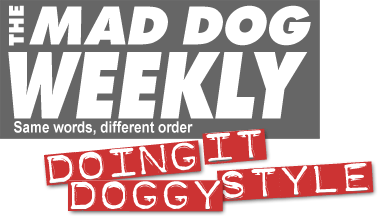|
| |
|
|
Are we@the end of punctuation as we know it?!
by Mad Dog
|
| What they should have added to the telephone were the ! and the ?.
At least these would have made it fun to talk to someone and hit a button to emphasize
what you just said. |
|
Punctuation’s a nice thing. Well, it used to be, anyway. "Sure, that’s easy for you to say. You
make your living using punctuation," you’re thinking as you remember your
third-grade teacher trying to drum it through your head that a semi-colon connects
independent clauses. Or was that dependent clauses? "
It’s true, but if it wasn’t for
punctuation we’d have nothing to break up those run-on sentences, set off a series of
thoughts, or show that we’re excited!!!!!! But nowadays punctuation and its kissing
cousin, symbols, are being usurped and changed for very nonpunctuational reasons.
Yes, we all know that English is a living
language. Unlike Latin, Mayan, and French, we believe in adding new words. The difference
is this time around it’s not common usage that’s changing the language,
it’s technology.
It started with the telephone. In the early
days it was easy—you picked up the phone and talked to Thomas Watson, since he was
the only other person who had a telephone. Then came the dial phone, with its letters and
numbers. When they created the Touch-tone phone, for some reason they decided to add two
symbols, the * and the #.
They probably did this because there were
an odd number of keys and they wanted a balanced layout. What they should have added were
the ! and the ?. At least these would have made it fun to talk to someone and hit a button
to emphasize what you just said. "I’m serious! *BEEP*" would have relayed a
lot.
|
The Wall Street Journal ("All the news that doesn’t fit in a stock market
table") says companies are switching from the hyphen to the period for their phone
numbers. They claim this is being done because it’s cool. |
|
But that’s
not what they did. And as if that wasn’t bad enough, they changed the name of the
symbols. The * used to be an asterisk, but now it’s a star. Is it any wonder children
all over the country think they’re singing about a telephone when they sing
"Twinkle, twinkle, little star"? This puts it right up there with the inability
to know what clockwise means as one of the great losses of the digital age. The other thing they added to the telephone is the
#. This was little used, and may not even be a punctuation mark if you want to get
technical about it, but you occasionally saw it used in place of the word
"number" or to indicate pounds. Well, they took the ‘s’ away and
turned it into the pound sign, as in "Pound your fist into the phone if you’re
stuck in voicemail hell and don’t want to hang up because you already have 17 minutes
invested in this long distance call."
Computers have screwed with punctuation
marks. The good old period (.) is now a dot, as in wherearethex-ratedpictures.com.
The Wall Street Journal ("All the news that doesn’t fit in a stock market
table") says companies are switching from the hyphen to the period for their phone
numbers, so 415-664-5555 becomes 415.664.5555. They claim this is being done because
it’s cool and is an offshoot of the dots used in computer addresses, but the truth is
the Europeans have been doing this since before Bill Gates bought out his first
competitor, so let’s be honest about it: we’re finally figuring out that panache
isn’t a candy.
|
I expect people will steal other punctuation marks. Of course, there are a few they could
take and no one would notice. The colon is one, since no one other than Edwin Newman knows
how to use it anyway. |
|
Of course,
there’s no question you can blame the Internet for co-opting @. Hell, no one ever
used it anyway. Most people had no idea what it was, when to use it, or what to call it.
Every once in a while you’d see it used to indicate "at", as in: 1 unused
symbol @ $30 apiece = a bargain. Well
it’s been upgraded again, from part of an email address to part of advertising. @Home
is the name of a cable Internet company. The Gap is running ads that say Gap@work. This
sounds like a conspiracy @ila the Hun would dream up, not those @aché carrying ad geeks
with @itude who couldn’t find @lanta in an @las.
(On a related topic, I have two simple
words for those people who have taken to saying "dub, dub, dub" in place of www:
Stop it. Now. It’s not cool, it’s not cute, and it sounds like you’re doing
a fish imitation. Okay, I won’t carp on this anymore.)
I expect people will steal other
punctuation marks. Of course, there are a few they could take and no one would notice. The
colon is one, since no one other than Edwin Newman knows how to use it anyway. And the
semicolon, which nobody cares about because it’s only half a punctuation mark.
Why don’t they take the &? No one
knows what it’s called, better yet bothers to use it. (HINT: It’s an ampersand.)
They’ve already appropriated the ~, which is okay since they pretty well made it up.
Sure it existed before the Internet, but it wasn’t on any keyboard I used.
Even better, why don’t they just make
up a few of their own? We could use a few more squiggles on this Earth. Now there’s
an @ractive idea.
©1998 Mad Dog Productions, Inc. All
Rights Reserved.
These columns appear in better newspapers across the country. They
use lots of punctuation.
|
|
|
|
|

